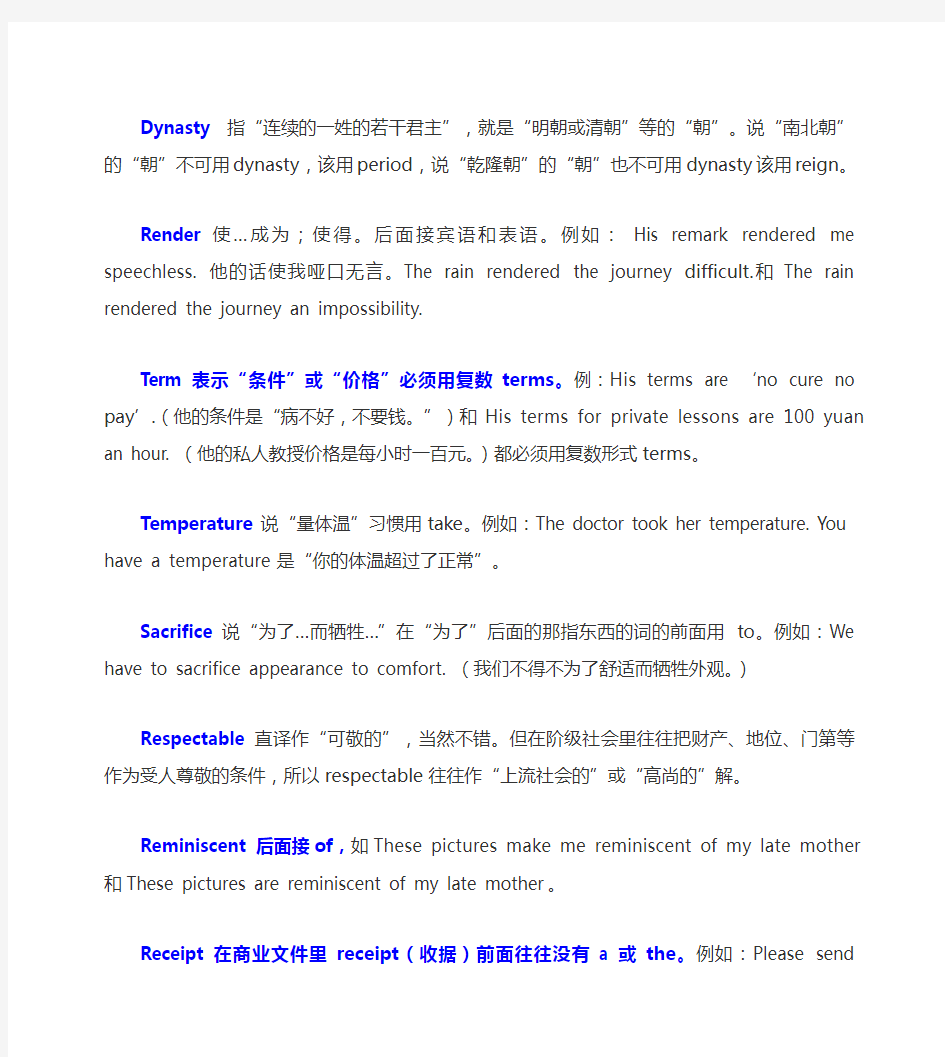

Dynasty 指“连续的一姓的若干君主”,就是“明朝或清朝”等的“朝”。说“南北朝”的“朝”不可用dynasty,该用period,说“乾隆朝”的“朝”也不可用dynasty该用reign。
Render 使…成为;使得。后面接宾语和表语。例如: His remark rendered me speechless. 他的话使我哑口无言。The rain rendered the journey difficult.和The rain rendered the journey an impossibility.
Term 表示“条件”或“价格”必须用复数terms。例:His terms are ‘no cure no pay’.(他的条件是“病不好,不要钱。”)和His terms for private lessons are 100 yuan an hour. (他的私人教授价格是每小时一百元。)都必须用复数形式terms。
Temperature说“量体温”习惯用take。例如:The doctor took her temperature. You have a temperature是“你的体温超过了正常”。
Sacrifice 说“为了…而牺牲…”在“为了”后面的那指东西的词的前面用to。例如:We have to sacrifice appearance to comfort. (我们不得不为了舒适而牺牲外观。)Respectable 直译作“可敬的”,当然不错。但在阶级社会里往往把财产、地位、门第等作为受人尊敬的条件,所以respectable往往作“上流社会的”或“高尚的”解。Reminiscent 后面接of,如These pictures make me reminiscent of my late mother 和These pictures are reminiscent of my late mother。
Receipt 在商业文件里receipt(收据)前面往往没有 a 或 the。例如:Please send receipt by return.和I am enclosing receipt for the goods received.
Manners是“礼貌”,Manner是“待人接物的态度”。但往往manners或manner在意思上几乎没有区别,如She has graceful manners和She has a graceful manner, I don’t like his manners和I don’t like his manner。
Instructive是“有教育意义的”,instructional是“属于教育一类的”。an instructive book是“一本有教育意义的书”,an instructional book是“一本教科书或以教育为目的的书”。
Function 可指正式的社交集会,前面用at。例如:He first met her at a social function. Forthcoming 用于人,作“肯给人方便的”解。例如:She was civil and forthcoming. Fruits of victory(胜利果实),fruits of labour(劳动果实)等表达方式里习惯用复数形式。
The following有时单数,有时复数,随意思而定,如 The following is my full name和The following are our full names。
As follows是习语,不论那句子的主语是单数或复数,只可用 as follows,不可用as follow,如 The rule is as follows和The rules are as follows。
Floor 和 Storey(在美国用story)都指房子的“层”,但下面几点该注意:
(1) floor着重在底面,stor(e)y 着重在空间,所以floor前面习惯用on,stor(e)y前面
习惯用in。
(2) 房子共有若干层,习惯用stor(e)y,不用floor。但说第几层上有什么,习惯用floor,不用stor(e)y,如说The library is on the second floor
Field在用作“田”解的时候前面用in。在用作“战场”或“运动场”解的时候field前面习惯
用on。
Favourable 作“赞成的”解后面接to。例如:He is favourable to our scheme. 作“有利(于事件或东西或人)的”解后面也接to,例如:This weather is favourable to our scheme.
Every有时用在抽象名词前面,作“完全的”解。例如:I wish you every success. He has every confidence in you.和I owe every gratitude to my parents.
下面两句里的to是介词,所以后面用动名词:
I advise you to pay more attention to recording new uses of old words.
Special attention has been paid to describing the treatment of unusual cases.
Consist of 和 contain不同。consist of后面接全体的各部分,contain后面接全体的一
部分。例如:The essay, which consists of ten paragraphs, contains two paragraphs of description.
Consult him是“向他请教”或“问他”,consult with him是“跟他商量”。书是不会说
话的,所以通常说consult the book, consult with the book(把书看作人)比较少见。
说到商店、机关、学校等,假使看作一个地点(point)用at,假使看作一个场所(place)用in,如 I met him at the post office和I work in the post office。
某月某日”有下面各种写法。注意不论怎样写法,月份和日子中间没有逗号:
① 24 April, ② 24th April, ③ April 24, ④ April 24th,
⑤ April the 24th, ⑥ the 24th April, ⑦ the 24th of April, ⑧ the 24th day of April
①和②在英国比在美国用得多。③和④英美通用。⑤和⑥在英国比在美国用得多。
⑦是着重式。⑧只用在正式文件里,不用在一般文字里。
Allow用作“说”或“声称”解,如 She allowed [that] he was right。主要用在美国。 allow of 和admit of意思相同,作“有…的余地”解,如 The question allows of no dispute。
Absence“不在上海”该说absence from Shanghai,
absence in Shanghai是“在上海”。
说得明白些,absence in Shanghai在事实上等于presence in Shanghai,不过absence in Shanghai有“不在它处而在上海”的意思。
Responsible 位置影响意思
He is the responsible person I spoke of just now. (他就是我刚才说起的那个可靠的人。)He is the person responsible I spoke of just now. (他就是我刚才说起的那个负责人。
Contagion 和 Infection不同。Contagion是“跟病人直接或间接接触而发生的传染”,infection是“通过空气、水等发生的传染”。但说“感染”或“蔓延”contagion和infection很
少区别,如the contagion of enthusiasm(热情的感染)和the infection of enthusiasm
都可以说。
Credible是“值得被信任的”或“可信的”。例如:I do not think him credible. 和All this information is credible.
Creditable是“值得被称赞的”或“优良的”。例如 The article is highly creditable to its author.
在同一个名词前面,有时用了China或Chinese便有不同的意思,如China correspondent是“在中国的通讯员”(未必是中国人),Chinese correspondent是“中国
籍的通讯员”(未必在中国),China edition是“专销到中国的版本”(未必是中文本),Chinese edition是“中文版本”
Belly是“肚”,指内部或外部都可以,如“肚里痛”和“肚上痛”两种表达方式里的“肚”都是belly。abdomen似乎只指内部,通常是科学上的名称。有些人嫌belly太俗气,又嫌abdomen不通俗,却用stomach指“肚”(兼指内外),其实stomach是“胃”不是“肚”,
这种用法是不妥的。
Abstain和refrain意思相仿,后面也都接from,但语气略有不同。abstain语气比refrain重些,有“故意避免”的意思,往往指习惯的行动,如abstain from tobacco有
“绝不抽烟”的意思。refrain有“欲发而止”的意思,往往指一时的行动,如refrain from laughter有“欲笑而不笑”的意思。
Advisedly是“在审慎考虑以后地”,有“别以为偶然或贸然”的意思。例如: When Tom called her a slattern, he used the offending word advisedly. Everything in this difficult situation has been done advisedly.
Identity是“身份”,identification是“身份的证明”。He refused to reveal his identity 和 His identity has not been established的identity不可改作identification。As he has gone away, his identification is hardly possible的identification不可作identity Netherlands(荷兰王国)被看作复数,前面有the。例如:The Netherlands are washed by the North Sea.
Repeat作“重复”解,repeat again是“第二次重复”,共有三次。说“重复”不该说repeat again,如He read the paragraph once over and then repeated it again里的again 该删。He repeated the paragraph five times(他把这段文字重复读了五次)该指“一共读了六次”。